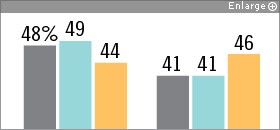Students with disabilities are as likely as typically developing students to enter science and engineering fields in college, according to new data from the National Science Foundation.
The finding is part of the NSF’s annual study of students from traditionally underrepresented groups—including women, minorities, and students with disabilities—in science, technology, engineering, and mathematics fields.

New federal data show that students with disabilities accounted for 1 in 10 undergraduate college students in the United States in 2012. They were more likely than other students to attend a two-year institution.
As of 2012, the most recent year for data, about 2.4 million of the 21.8 million students pursuing an undergraduate degree reported having a disability. That’s 11 percent, roughly on par with the 12 percent of K-12 students with a disability in U.S. schools. Those with disabilities were significantly older than undergraduates without disabilities; 36 percent were older than 30, compared with only 24 percent of those without disabilities. They were also slightly more likely than students without a disability to attend two-year rather than four-year colleges.
The data show students with disabilities were as likely as other students to enroll in science fields; they were a little more likely to study computer science and slightly less likely to pursue engineering or life sciences than their nondisabled peers. Students with disabilities were also equally likely to get financial aid for college.
However, students with disabilities were less likely to enroll in graduate school, often needed for top science careers, the data show. In 2012, only 7 percent of graduate students reported having a disability. And once out of college, students with disabilities who do go into science and engineering fields are as likely as their nondisabled peers to work in industry or government jobs.





